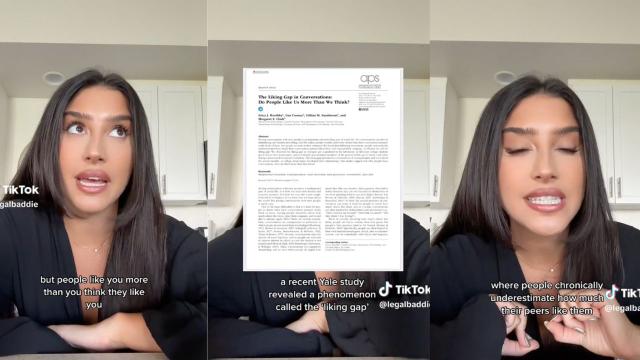Are you constantly worried about making a bad first impression? Do you replay social interactions in your head, fretting about everything you said or did? Do you walk around worrying that friends, co-workers and passing strangers dislike you? Well, you’re not alone because according to a trending TikTok concept labelled “the liking gap”, most people feel this way. The even better news? People actually like you *a lot* more than you think they do.
As our pals at Refinery29 have covered, TikTok user Dellara perfectly summed up this concept in a video that has since racked up over 5.2 million views and 1.1 million likes on the video streaming platform.
“You are more liked than you think you are,” Dellara said in the TikTok post. “My friends think that I like them less than I actually like them and they like me more than I actually think that they like me.”
@dellara
While the phenomenon has recently gained exposure on social media, it actually originated in a 2018 study published in the journal Psychological Science. Researchers followed several scenarios of people getting to know each other — for example, new roommates, co-workers and even strangers who were forced to chat with each other. Participants were then asked how much they liked the person they were getting to know as well as how much they thought the other person liked them. They concluded that everyone ranked their “perceived liking” a lot lower than how their partner actually felt about them, with shy people having an even larger gap. Hence, the evolution of “the liking gap”.
It’s a problem because the concept can interfere with budding relationships in your work and personal life, as highlighted in another 2021 study published in the journal Organizational Behaviour and Human Decision Processes. The research found people are less likely to ask for help, offer feedback and work on group projects when they believe others don’t like them. It can also become detrimental if you overlook the positives in every interaction and hyper-focus on everything that can – and could – go wrong.
In saying this, our own self-criticising habits aren’t all doom and gloom — they work in our favour, too. For instance, they help us think before we speak, allow us to make appropriate judgment calls in social situations, limit us from going overboard in conversations (IRL and over text) and stop us from oversharing.
You can also breathe a sigh of relief knowing that the liking gap diminishes over time in longer-term relationships like roommates and co-workers, which makes sense since you should feel more comfortable around the people you spend the most time with.
So, the moral of the story: approach new relationships knowing that you’re always going to be your own worst critic. Do this, and all your conversations may start to feel a lot less painful.

Leave a Reply
You must be logged in to post a comment.